

The Reductive Seduction of Other People’s Problems – The Development Set – Medium. The “reductive seduction” is not malicious, but it can be reckless.
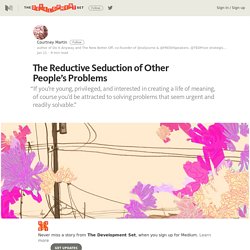
For two reasons. First, it’s dangerous for the people whose problems you’ve mistakenly diagnosed as easily solvable. There is real fallout when well-intentioned people attempt to solve problems without acknowledging the underlying complexity. There are so many examples. La technologie est-elle toujours la solution ? (2/2) : le risque du solutionnisme. Dans une récente tribune pour le New York Times, l’essayiste et chercheur Evgeny Morozov (@evgenymorozov) expliquait assez clairement ce qu’il définit comme le « solutionnisme », qui est le second concept au coeur de la critique du livre qu’il vient de publier Pour tout sauver, cliquez-là.

L’actualité apporte chaque jour son lot de nouveaux services en ligne, tous plus indispensables les uns que les autres, comme LivesOn, le service qui vous propose une vie sociale après la mort, en vous permettant de continuer à twitter après votre mort, grâce à l’analyse des tweets que vous avez publiés jusque-là, via un algorithme capable de prolonger vos goûts et votre syntaxe en les greffant à l’actualité. Eqradio paper. Galvanic Skin Response (GSR): The Definitive Pocket Guide. The Future of Wearables. How wearable technology will change our lives. Best Anxiety Apps of 2016. Chances are, you or someone you know suffers with anxiety.

Whether it’s a mild feeling of apprehension and unease before a completely routine event, or a full-blown panic attack — anxiety can disrupt your daily life. According to the Anxiety and Depression Association of America, anxiety disorders are the most common kind of mental illness. They include post-traumatic stress disorder, obsessive-compulsive disorder, general anxiety, social anxiety, panic disorder, and even forms of depression. They affect 18 percent of the U.S. adult population. Still, only one-third of those affected seek help. Thync, Investing in the Future of Stress Relief Wearables. Did you ever imagine that you will be able to own a wearable that will allow you to shift mental states in minutes?
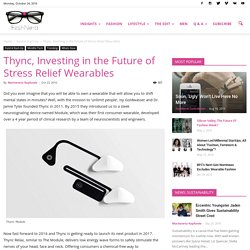
Well, with the mission to ‘unlimit people’, Isy Goldwasser and Dr. Jamie Tyler founded Thync in 2011. Why Some Wearable Cameras Work And Others Are Just Plain Creepy. Earlier this year, Pentagram partner Marina Willer and a cadre of her colleagues roamed London's streets on a search for the city's most beautiful manhole covers.
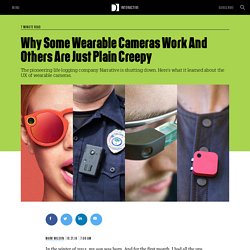
Yes, manhole covers: those ubiquitous metal caps over access points to the gritty infrastructural underbelly of a city. The gateways to the smelly sewers, tangles of phone and power lines, and labyrinth of water pipes that we step over every day and rarely notice. When a particular manhole caught the eye of one of the graphic designers in the group, they pulled out a sheet of paper and a hunk of graphite and crouched down to make an old-fashioned rubbing of the patterns stamped into the metal. Affect-tag, système de captation des émotions. Développé en collaboration avec la recherche scientifique, le bracelet connecté permet une mesure simple et nomade de l’engagement.
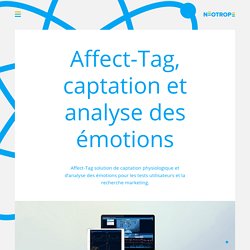
L’outil de visualisation sur tablette permet une observation en temps réel des constantes tandis que le software d’analyse facilite une interprétation efficace et rapide des émotions de l’utilisateur mesurées pendant son expérience. The PIP : le capteur qui mesure votre stress pour vous aidez à décompresser ! PIP est un bio-capteur qui mesure votre niveau de stress lorsque vous le pressez entre vos doigts.

Accuracy should be a priority for wearable tech according to survey. We're always keen to learn more about what people think about wearable tech and a recent survey has revealed some interesting insights into expectations and attitudes towards fitness trackers, smartwatches, smart clothing and the rest of the wearable fraternity.
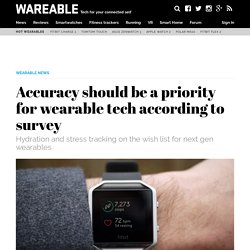
The survey was conducted by the MEMS & Sensors Industry Group and Valencell, a company that provides biometric sensor technology for wearables and currently has its tech inside Jabra's Pulse Sport headphones and the Atlas Wristband gym tracker. We recently spoke to Valencell to get its thoughts on the big optical heart rate accuracy debate. Stress beating tech to keep you sane. You'd be forgiven for assuming that wearable tech is all about fitness trackers to help shed the pounds and keeping you on track to reach your fitness goals.
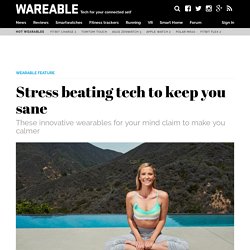
Over the past year there's been a steady rise in tech aimed at keeping our minds in shape, just as much as our bodies. Gary Wolf: The quantified self. Paul Ekman. Dr.
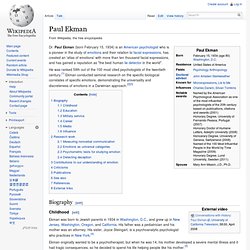
Paul Ekman (born February 15, 1934) is an American psychologist who is a pioneer in the study of emotions and their relation to facial expressions, has created an 'atlas of emotions' with more than ten thousand facial expressions, and has gained a reputation as "the best human lie detector in the world". He was ranked 59th out of the 100 most cited psychologists of the twentieth century.[1] Ekman conducted seminal research on the specific biological correlates of specific emotions, demonstrating the universality and discreteness of emotions in a Darwinian approach.[2][3] Biography[edit] Childhood[edit]
Hillary Clinton’s speech: highlights. 20+ Emotion Recognition APIs That Will Leave You Impressed, and Concerned. If businesses could sense emotion using tech at all times, they could capitalize on it to sell to the consumer in the opportune moment. A Technology That Reveals Your Feelings. Microsoft Band review: sensor-packed – if you don't mind looking like an offender. Microsoft’s first piece of wearable technology since the Spot smartwatch is a fitness tracker packed with 10 sensors, but does it put others to shame? The company best known for Windows, Office, and PC/tablet hybrids such as the Surface, is no stranger to health and fitness. Microsoft’s HealthVault – a service for storing and maintaining health and fitness data – has been around since 2007, storing data from fitness trackers and medical devices alike and now underpins the new Health app.
Fitness band or ankle bracelet? The Microsoft Band is a bit like marmite.